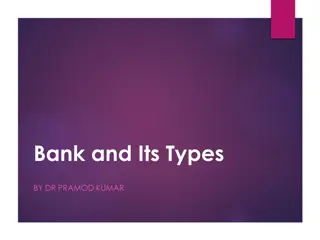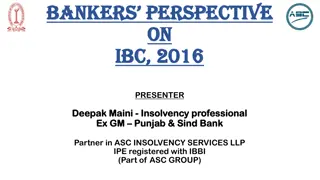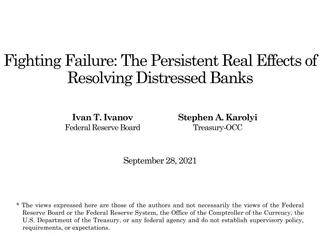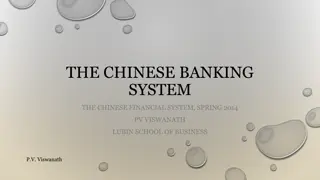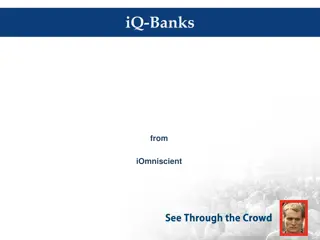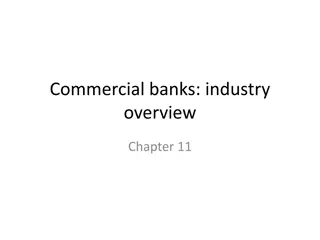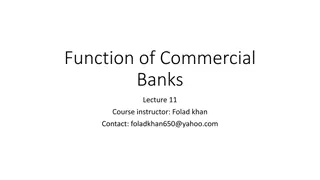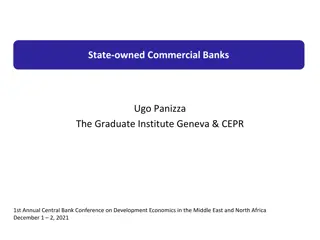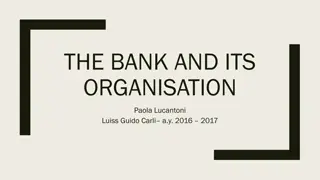Challenges and Future Prospects for Cypriot Banks
The presentation delves into the global challenges faced by Cypriot banks, including the economic impacts of the pandemic and the Russian invasion of Ukraine. It highlights advancements in anti-money laundering efforts, the adoption of ESG standards by Cypriot banks, and the importance of addressing
0 views • 34 slides
Understanding the Functions of Commercial Banks
Commercial banks play a vital role in the financial system by accepting deposits and providing loans to individuals, businesses, and companies. They offer various types of accounts such as current, saving, and fixed deposit, each with its unique features. Additionally, commercial banks make loans in
4 views • 10 slides
Understanding Banks and Mobile Banks in Financial Services
The concept of banks originates from the word "banco," meaning bench, which evolved to refer to a financial institution. Banks gather funds from the public as deposits and distribute them as credits to enhance people's living standards. Additionally, mobile banks, unlike traditional banks, provide l
7 views • 11 slides
Overview of Banking Institutions and Types
Banking institutions play a crucial role in the economy by accepting deposits from the public and providing financial services. They are classified into various types such as commercial banks, investment banks, cooperative banks, and central banks. Commercial banks cater to the working capital needs
1 views • 13 slides
Functions of Commercial Banks Explained
Commercial banks provide a range of services beyond their primary functions, acting as agents for customers in collection and payment of credit, purchase and sale of securities, trustee and executor roles, remittance of money, and representation and correspondence. Additionally, they offer general u
0 views • 7 slides
Understanding the Banking Sector Fundamentals
Banks play a vital role in the economy by accepting deposits and providing loans, aiding in capital formation and accumulation. The word "bank" originates from the French term for a bench. The Banking Regulation Act of 1949 defines banking activities. Banks deal with money deposits, credit, and comm
0 views • 20 slides
Understanding the Importance of Seed Banks in Ecosystems
Seed banks, categorized into soil and aerial types, serve as essential reservoirs for viable seeds and propagules. Soil seed banks are natural storage areas for seeds within ecosystems and play a crucial role in plant regeneration. They can persist for varying durations, influencing plant diversity
1 views • 16 slides
Understanding Different Types of Banks in India
Explore the various types of banks in India, including Scheduled Banks, Non-Scheduled Banks, Commercial Banks, and Cooperative Banks. Learn about their classifications, regulations, and primary functions as detailed by experts in the field. Discover the significance of banking operations as governed
0 views • 18 slides
Overview of Development Banks and Their Functions
Development banks, including national and foreign entities, play a crucial role in promoting economic, social, and environmental development by financing projects that may not receive adequate private funding. These banks are typically government-owned but may have mixed or private ownership. They a
0 views • 37 slides
Overview of European Banking Union: Pros and Cons
The European Banking Union comprises three pillars: Single Rule Book, Single Supervisory Mechanism (SSM), and Single Resolution Mechanism (SRM). The SSM, overseen by the ECB, supervises significant banks. Safeguards are in place for non-euro members. The SRM, managed by the SRB, aims at orderly reso
0 views • 16 slides
Challenges Faced by Banks in Adopting IBC
Banks face challenges in adopting the Insolvency and Bankruptcy Code (IBC) due to stringent provisioning norms, additional costs, and complexities in referring cases to the National Company Law Tribunal (NCLT). Secured NPA accounts older than 2 years, unsecured NPA accounts in the second year, and c
0 views • 20 slides
Democracy and Rule of Law Transformations in the European Union
Democracy and the rule of law in the European Union are facing challenges such as backsliding and low voter turnout. This article discusses tools the EU can use to address these crises, ways to strengthen the link between the European Parliament and its citizens, factors affecting voter turnout in E
0 views • 10 slides
Role of Securities Firms and Investment Banks in Financial Markets
Securities firms and investment banks play a vital role in facilitating the transfer of funds between suppliers and users in financial markets with efficiency and low costs. Investment banks assist businesses and governments in raising funds through securities issuance, while securities firms aid in
0 views • 26 slides
Functions of Commercial Banks
Primary functions of commercial banks include acceptance of deposits such as fixed deposit, current deposit, saving deposit, and recurring deposit. Banks also advance loans for productive purposes, including call money, overdraft, cash credit, and discounting of bills. Another crucial function is cr
0 views • 6 slides
Mitigation and Conservation Banks: A Comprehensive Overview
This content presents insights from Wayne White, President of the National Mitigation Banking Association, regarding the concept of mitigation/conservation banks, their evolution, benefits, agency requirements, and the principles behind their establishment. It emphasizes the importance of market-dri
0 views • 28 slides
Explanations of Icelandic Financial Collapse in 2008: Neoliberalism or Government Intervention?
The Icelandic financial collapse of 2008 was not solely attributed to neoliberal policies or government intervention but rather a combination of factors including vulnerable economic conditions and critical decision-making. Contrary to popular belief, Iceland was not more reckless or oversized in it
0 views • 18 slides
Banking Ethics and Cultural Evolution in Financial Institutions
Commercial banks face ethical challenges, with smaller banks generally maintaining higher ethical standards. The ethical practices of banks include good customer service, transparency, and sustainable lending. Banks have a dual nature of profit-making and ethical obligations. The marketization of so
0 views • 21 slides
Understanding the Real Effects of Resolving Distressed Banks
This study delves into the lasting impact of resolving distressed banks on the economy, showcasing significant compliance with regulatory thresholds and persistent adverse effects on local economies post-resolution. Findings suggest a notable drop in employment and establishments, with effects inten
0 views • 18 slides
Understanding Banking Institutions and Their Types
Banking institutions play a vital role in the financial sector by mobilizing public savings and providing funds to meet various financial needs. Commercial banks, investment banks, co-operative banks, and central banks are some examples of banking institutions. Scheduled banks enjoy certain benefits
0 views • 17 slides
Role and Functions of Commercial Banks in the Financial Sector
Commercial banks are profit-seeking financial institutions that accept deposits from the public and provide loans for investment purposes. They specialize in financing trade and commerce through short-term loans, utilizing the interest rate difference between borrowers and depositors as a primary in
0 views • 6 slides
Institutional Framework and Antitrust Law in the EU
The European Union's institutional framework is defined by the Treaties of Lisbon, European Union, and Functioning of European Union. These treaties establish the EU's objectives, governance principles, and delineate competences. Additionally, EU antitrust law principles are based on the Treaties of
0 views • 16 slides
Evolution of the Chinese Banking System: A Historical Overview
The evolution of the Chinese banking system from a mono-bank to a tripartite system comprising central, development, and commercial banks is explored. The transition to market-based banking, equitization of state-owned banks, and the role of regulatory bodies in managing bad loans are discussed. The
0 views • 25 slides
iQ-Banks Security and Operations Solutions Overview
iQ-Banks offers a range of advanced solutions for ATM security, branch operations, face recognition, and mobile agent communication. These solutions include features such as detecting theft, vandalism, skimming devices, and intrusions, as well as providing access control, license plate recognition,
0 views • 6 slides
Comprehensive European Astronomy Development Planning by ASTRONET
ASTRONET, a group of European funding agencies and infrastructures, coordinates all aspects of European astronomy. Established in the early 2000s with EU funding, ASTRONET focuses on long-term planning for the development of European astronomy. It has created the European Science Vision and Infrastr
1 views • 7 slides
Overview of Commercial Banks in the Financial Industry
Commercial banks play a crucial role in the financial industry by accepting customer deposits, providing loans, and facilitating the transmission of monetary policy. They differ from nonfinancial firms in their balance sheets, with assets mainly composed of loans and other financial assets. Regulate
0 views • 23 slides
Understanding the Role of Commercial Banks in Financial Systems
Commercial banks play a vital role in the financial system by accepting deposits and providing loans to individuals, firms, and companies. They offer various types of accounts like current, savings, and fixed deposit accounts, each with specific features. In addition, commercial banks make loans to
0 views • 10 slides
Analysis of State-owned Commercial Banks Ownership Patterns
Data analysis of ownership histories for over 27,000 commercial banks in 184 countries from 1995-2018, focusing on state-owned banks. The study reviews state ownership trends, correlations with bank performance, industry-level evidence, and lending to governments. The research also delves into perfo
0 views • 28 slides
Update on Direct Cash Settlement Implementation in Nigerian Capital Market
The update on Direct Cash Settlement (DCS) in the Nigerian Capital Market as of November 2016, by Ade Bajomo, covers progress on DCS account set-up requests to settlement banks, BVN validation by brokers, analysis of rejected DCS account set-up requests, major challenges faced, and recommendations f
0 views • 10 slides
European Railway Agency's Role in Promoting Cooperation between Rail and Buses in Telematics Applications
The European Railway Agency (ERA) plays a crucial role in enhancing cooperation between rail and buses through Telematics Applications. Established in 2004, ERA focuses on recommending legislation, ensuring interoperability, and enhancing safety in the European rail network. Recommendations made by
0 views • 17 slides
EU-CERT: European Certificates and Accreditation for European Projects
The EU-CERT project involves European Certificates and Accreditation for European Projects, with upcoming events like the Transnational Partner Meeting (TPM5) in Paderborn, Germany, and the Final Policy Recommendation Conference in March 2024. The accreditation website tool and related information a
0 views • 4 slides
The Polish Banking Sector 2013/2014 Overview
The data provides insights into the Polish banking sector for the years 2013 and 2014, including information on the number of banks, ownership structure, assets, profits, and the percentage of assets belonging to loss-bearing banks compared to other EU countries. There is a visible trend of increasi
0 views • 17 slides
Agricultural Finance and Banking System Overview
Agricultural finance encompasses various services to support farm activities, with sources including institutional and non-institutional channels. In India, agricultural credit is available from sources like moneylenders, co-operatives, and commercial banks. Commercial banks play a crucial role in p
0 views • 12 slides
Understanding the Evolution of Danish Banks: Past, Present, and Future
Explore the fascinating journey of Danish banks through the past, present, and future at the FRIC Practitioner Seminar. Delve into topics such as insolvency regulation, bank resolution, investor roles, and the concentration of financial institutions in Denmark. Gain valuable insights into the essent
0 views • 30 slides
Evolution of Banking Institutions: History, Practices, and Regulations
Delve into the evolution of banking institutions from money changers to modern commercial and investment banks. Explore the historical context, current practices, and regulatory frameworks governing banking activities at both the EU level and within individual Member States. Discover the distinction
0 views • 14 slides
Risk Management Challenges in African Central Banks
African central banks face challenges in risk management, particularly in trade banks default payments, credit risks, and handling electronic money. The banking sector in Africa shows weaknesses in lending to small and medium enterprises and lacks a strong capital market infrastructure, impacting th
0 views • 20 slides
Functional and Lexical Distribution of Indo-European Verbs
Investigating the functional and lexical distribution of Indo-European verb classes, this research delves into the mi- and xa-conjugations in Proto-Indo-European, new discoveries in the preterit of the xa-conjugation, paradigms in Hittite, perfect and middle endings in Late Indo-European, and the ch
0 views • 18 slides
Functions of Commercial Banks
Commercial banks serve the main function of accepting deposits and providing loans to maximize profits. The primary functions include accepting deposits and advancing loans and investments. Deposits come in various types such as current, savings, term/time, and recurring deposits. Loans provided inc
0 views • 14 slides
European Deposit Insurance Scheme (EDIS) - Towards a Safer Banking Industry in Europe
The European Commission initiated the European Deposit Insurance Scheme (EDIS) to strengthen confidence in the banking industry in Europe, solidifying the European monetary union. EDIS will be phased in from 2017 to 2024, providing more stability for European depositors and addressing potential pitf
0 views • 10 slides
Italian and European Company Law: Key Insights for 2020/2021
Delve into the intricacies of Italian and European company law for the academic year 2020/2021 with Dott. Giulia Gabassi. Explore topics such as European Economic Interest Grouping (EEIG), European legislation, Court of Justice regulations, directives, and uniform models. Understand the importance o
0 views • 88 slides
Multirate Systems and Filter Banks in Software Defined Radio PhD Program
Dive into the world of multirate systems and filter banks in a Software Defined Radio PhD Program focused on electrical engineering. Explore topics like interpolation, decimation, time and frequency multiplexing, and more. Discover how filter banks split and combine input signals, and learn about th
0 views • 45 slides







